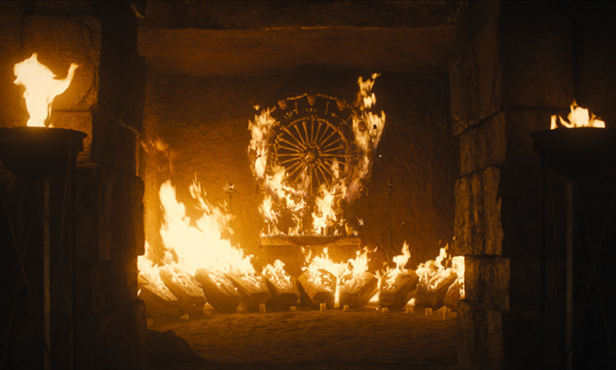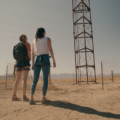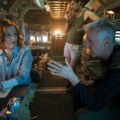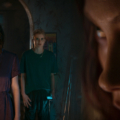We’re heading back to the world of the Omen nearly 50 years after the first movie was released with new prequel horror The First Omen.
Starring Servant’s Nell Tiger Free and directed by Legion’s Arkasha Stevenson, The First Omen follows a young American woman who is sent to Rome to begin a life of service to the church. However, she soon encounters a darkness that causes her to question her own faith and uncovers a terrifying conspiracy that hopes to bring about the birth of evil incarnate.
We sat down with Arkasha Stevenson to talk about her love of horror movies and why she’s happy her Omen movie has been made from a female perspective…
How did you get involved with The First Omen?
I was super lucky. A friend who works with the production company gave me the script and let me read it. I’m so thankful that she did because I ended up really falling in love with it. I loved that they decided to make it a female-led story. I thought that the lead character was so interesting; she grew up in an orphanage her whole life and then immediately was going to go become a nun. That kind of worldview and exposure to the world was so exciting to explore. So I was in right off the bat!
Were you already familiar with the Omen movies?
My mum raised me on Seventies horror and she started when I was super young. So I didn’t realise I was watching a horror film, I was just like ‘oh, I’m watching life. This is The Exorcist. Sure, it’s just people’s experience [haha!]’.
The Omen movies have many iconic scenes and set pieces. Do you have a favourite?
For sure and it’s probably not an obvious thing. Do you remember that scene where Gregory Peck is holding Lee Remick in bed and she says ‘I think I need you to call me a doctor because I think I’m going crazy’. That is what I remember more than anything. Even as a kid, that terrified me because it first introduced the concept of people dislocating from reality and not knowing what’s real and what’s not real.
That scared me as a kid but continues to scare me even now. Especially as a woman. I think a lot of our life is deciphering what’s a threat, and what’s not a threat. So I was really excited to explore that and have the opportunity to explain that in this film, especially with The Omen having been the first thing to introduce me to that fear.
That’s interesting! It’s usually the gory scenes that stay with people…
Totally. The gore is really exciting, but that’s not what I remember and that’s not what stayed with me. This film is particularly interested in repressed trauma, and repressed intuition. What’s your intuition telling you that something’s wrong? What’s a repressed memory that’s resurfacing? What’s actually not part of this reality? What’s something that’s supernatural that’s then invading your mind and your body?
Having to tease all of that out and navigate it is what this main character really has to do. So it’s this weird exercise in madness, which you know… welcome to my life!
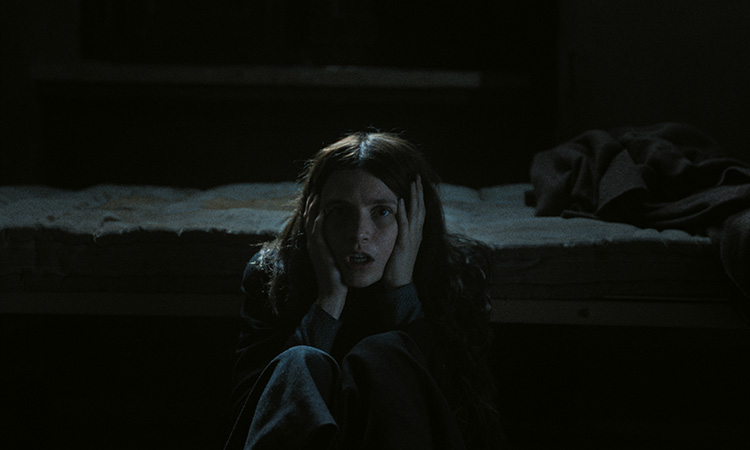
What can you tell about the main character in the movie, Margaret?
She’s really interesting. She has been raised in this orphanage and then immediately goes from that to becoming an initiate, who’s about to take her vows. So she goes from one kind of vacuum to another, and there isn’t a lot of life exposure. There’s not a lot of exposure to the world so this is a character who’s going to Rome for the first time, which, as an American having gone to Rome for the first time for this project was a very beautifully overwhelming experience.
It’s a very sensual city, with the art and the people and the fashion. It was exciting to explore somebody who’s never been exposed to sex or the idea of sexuality, then being plopped into that city. Somebody who’s never really had a firm ground on a sense of security.
So it was really interesting exploring that through her eyes, but then also exploring this other dark side about how that is going to be used against her down the line and how that very quickly turns into a horror story, whether you’re in the horror genre or not.
The First Omen feels like a Seventies horror movie. Was that always the intention?
We worked so hard to do that! We worked really hard to regulate ourselves to not use a lot of Steadicam, trying to stay in studio mode a lot, but then also to not have this digital slickness that tips you off to the fact that you’re watching a modern horror film.
My DP was Aaron Morton and I feel like the film has a sense of realism and naturalism to it, while also having stylish moments, which is this delicate tightrope walk that we worked hard to try and create.
How does The First Omen fit within the wider Omen franchise?
By the end of watching our movie – and I don’t want to fully spoil it because I think it’s a really fun journey to discover how we lead up to the original – but by the end of our film, you know exactly where you’re headed.
You’re navigated in the direction directly to the 1976 The Omen. There are a lot of easter eggs. We really tried to answer a lot of questions that I myself had watching the 1976 version.
It was important for us to not copy The Omen and not try and rip it off and to have our own voice and our own style, and also our own message that we were hoping to be in conversation with the 1976 version. Because it’s such a perfect movie and it’s also very sacred to a lot of horror fans. So if you get too close to it, people are going to smell that, and not appreciate that. So you have to create something new.
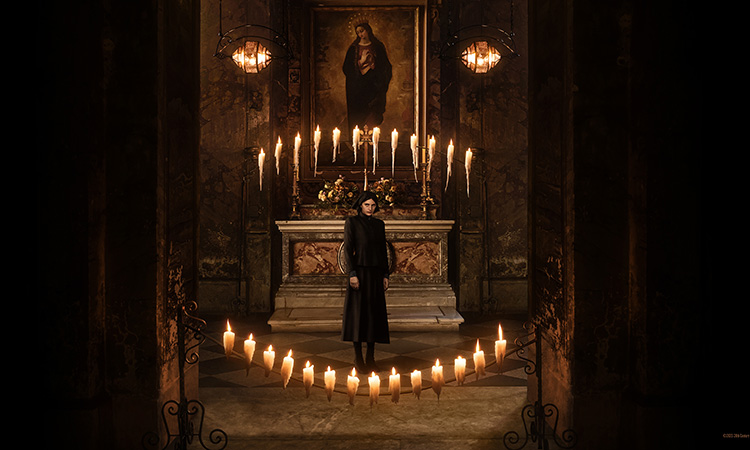
The first Omen movie was released in 1976. What do you think it is about this world that keeps us coming back for more?
It’s so strange because history really does repeat itself. I think that the movie and what it is talking about is just as pertinent today as it was back then.
One of the things that I talked a lot with my writing partner Tim Smith about was all the movies that were made in that era, the 1976 Omen era. If you look at Rosemary’s Baby, The Exorcist, The Omen, people were just terrified of their children. That was during the time of the counterculture in America, and people had fresh ideas. They were rejecting tradition. I’m sure that was so terrifying for the older generation and were very threatened by that. So I think for us, it was very easy to be in conversation with that because for me, I’m on the other end of that. I’m terrified of the older generation right now. I’m terrified of what’s happening in America. So there’s a lot to unpack there. There are a lot of parallels, historic parallels.
Also, these are movies about hell on earth, and how to confront hell on earth and how that comes into being and I think that people are constantly grappling with that. So a story like The Omen is never going to get old because hell is never going to go away!
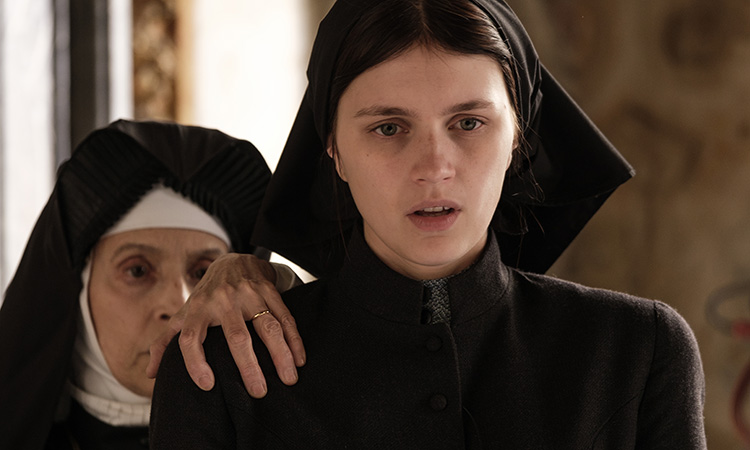
What do you think it is about horror that gives it a good platform to reflect the society of the time?
For me was the closest thing to social realism. Horror is meant to reflect the masked collective fears of a culture at that time, and with movies like The Omen or The Exorcist, those fears don’t go away, generation to generation. The world does not change that quickly and so in a weird way, horror is such a comforting genre because you feel like ‘oh, you’re terrified by that? Me too’.
Also you can speak so openly. Horror fans are very open-minded and willing to engage in those conversations.
What kind of scares can audiences expect in The First Omen?
The thing that I loved about the 1976 version is that I feel like that’s really a drama, first and foremost. So that was something that we really kept in mind when making this film. Something that I really love to do is explore body horror and what was nice about this film is getting to explore the paranoia that comes with living in a female body. You’re just constantly terrified that people are going to try and put things in and take things out of your body all the time. Growing up I don’t think I saw a lot of female-created body horror. So a lot of the time the female body was sexualized and fetishized and that was something that was alien to me as a kid growing up.
It’s a studio horror film, but it also in a way is a personal diary of my own personal fears of what people may want to do or can do, to my physical being. That was something that Nell was really engaged in and so helpful with and willing to take the plunge and make herself vulnerable to those fears.
What are you most looking forward to audiences seeing in the movie?
Honestly, trying to do a prequel or anything when it comes to The Omen is such delicate business. I’m really proud of all our collaborators and Nell is just such a film goddess. She shines so strongly in this film and I’m so excited for people to see that.
I just think that their work was so inspiring and incredible, and I just feel like a proud mum. I just want to show everybody.
